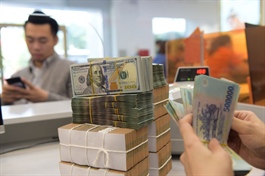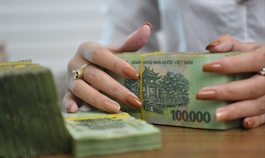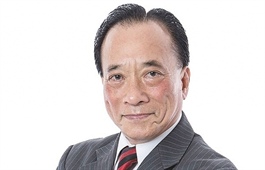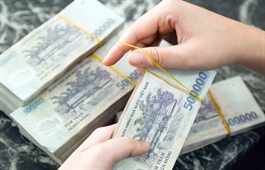Banks step up to lure demand deposits
Banks step up to lure demand deposits
Competition among banks to lure demand deposits is becoming fiercer as the cheap capital source helps banks increase their net interest income (NIM) ratio. 
Demand deposits have very low interest rates of only 0.1 per cent per year. Therefore, banks will have low input capital costs and ease to increase their NIM ratio if they have high current account savings account (CASA) ratio – or the proportion of demand deposits out of total deposits.
Besides, CASA also reflects customers' belief and assessment of banks’ service quality, especially payment services. Therefore, increasing CASA has become extremely important in retail banking strategy and many banks consider it one of the top targets in recent years.
Before 2018, Vietcombank and MBBank were the two banks with the largest proportion of CASA in the banking system. While Vietcombank had an advantage in luring demand deposits through transactions of State-owned agencies and enterprises, MBBank benefited from defence agencies and enterprises.
However, in the past two years, Techcombank has risen to the top and is increasingly outstripping the two banks. According to Techcombank's financial statements, its demand deposits in 2020 increased by 60.6 per cent to VND128 trillion (US$5.56 billion). The bank’s CASA ratio by the end of 2020 reached 46.1 per cent, a sharp increase from 34.5 per cent at the end of 2019 and also higher than Vietcombank (about 33 per cent) and MB (about 37 per cent).
Techcombank has so far had an ambitious target to increase its CASA ratio to 55 per cent by 2025.
Besides Techcombank, many other private banks, such as TPBank and VPBank, also posted impressive CASA growth last year.
At VPBank, demand deposits increased by 28 per cent to more than VND35.4 trillion, helping the bank increase its CASA rate from 13.2 per cent to 15.6 per cent. TPBank's demand deposits increased by 48 per cent last year to more than VND21.2 trillion, pushing the bank’s CASA rate up from 16.5 per cent to 19.4 per cent.
To increase CASA, banks have taken many policies, including offering free money transfers and investing in digital technology to attract customers.
Techcombank can be considered the first private bank to initiate this wave when it focused on building advantages in payment. Since 2016, this bank has implemented many promotion programmes for customers such as free of charge e-banking transactions and account management.
Following suit, many other private banks have also entered the race of providing free service. VIB has introduced a policy of free of charge money transfers and withdrawals for new customers or payment accounts with an average balance of at least VND5 million. Customers transferring money online via TPBank also received the free service policy.
The increasingly fierce competition in the race to lure demand deposits has forced Vietcombank and MBBank to take action.
Vietcombank has recently announced integrated transaction account packages that cover account services, digital banking and debit cards, helping customers transfer money free of charge on VCB Digibank.
Meanwhile, besides implementing a series of digital products, MBBank has implemented a programme to open accounts with lucky numbers at the request of customers in the past year. In 2020, the bank also offered free money transfer service on MBBank app. As a result, the bank's CASA also increased significantly from 34 per cent in 2019 to 37 per cent in 2020.

























